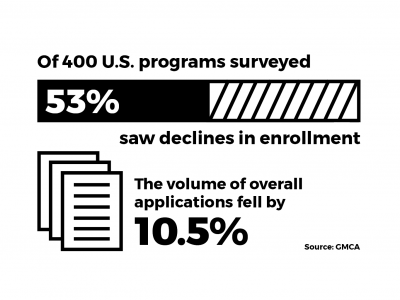
U.S. universities are reporting a decline in the number of international students applying for graduate business programs, according to a study from the Graduate Management Admission Council. Some speculate that this change is a result of the current political climate and changes made by the Trump administration to immigration policy.
According to the October report by the GMAC, of the 400 U.S. programs surveyed, 53 percent reported declines in international applications this year. Overall, international application volumes fell 10.5 percent since 2017.
At the Boston University Questrom School of Business, the percentage of international applicants for the full-time master’s in business program dropped 20 percent from the fall 2017 applicant numbers.
Meredith Siegel, assistant dean of graduate admissions for Questrom, wrote in an email that this decrease has an impact on BU, both culturally and academically.
“I absolutely think that the decrease in international students has an impact at BU,” Siegel wrote. “When the number of international students decreases — or the number of countries from which these students enroll is reduced — the opportunity for all students to broaden their perspectives, and thus their problem solving abilities, is also reduced.”
Although Siegel explained that there is no data to prove a direct correlation between Trump’s policies and the decrease in international applicants, she said she has heard from students that executive orders like the travel ban have made students worry about the status of their visas.
“… this administration has sharply reduced the number of H1-B (or working) visas available to students with a US degree who want to stay in the US to work,” Siegel wrote. “Without the prospect of staying for a few years after graduation, for some, that makes a US degree less attractive.”
Nicholas Ashford, a professor of technology and policy at the Massachusetts Institute of Technology, said he has mentored many master students from different parts of the world and that it has been difficult for those students to obtain visas on time.
“In general, people from certain parts of the world are not even applying because they do not want to go through a disagreeable screening process to come here,” Ashford explained. “The Trump administration has a direct effect on students’ decision not to apply to U.S. graduate programs. It is so difficult for them to begin to get a visa in a timely manner so they are going to other parts of Europe for education.”
Ashford said he thinks the decrease of international applicants is causing the United States to miss out on talented students.
“We do not have the benefits of their talent on our projects and the possibility of them staying on as people who work for this country,” Ashford said. “Also, these people are destined to become leaders of their countries and to be told that they are not welcomed here is the most unfortunate.”
Ashford said that if these changes affect the diversity of schools, it would be a missed opportunity for cross-cultural learning.
“[International students provide] an opportunity to become culturally more sophisticated, to educate people who go back to their country and have an impression on the United States,” he said. “I think the country is losing, and the schools are losing.”
Several students at Boston-area universities said international students already face many challenges but are now also having to deal with Trump’s immigration policies.
Julia Bertsch, a sophomore at Northeastern University, said the decrease of international students is something she believes is ethnocentric.
“I think the decrease of international students will negatively impact the school,” Bertsch said. “Although it will provide more opportunities to locals and U.S. citizens, there would be less diversity and less cultural awareness.”
Ignacio Castineiras, a junior at MIT, said he does not know the specific policies that could affect college students but that he has international friends who have experienced difficulties.
“I had two friends that went back home for vacation to see their families, and then legislation was passed that made it nearly impossible for them to come back to the U.S. to continue school,” Castineiras said. “MIT had to use its networks to bring its students back.”
Meghan Tokala, a sophomore at Northeastern, said she is not surprised by the decline of international students because she thinks Trump has created a divide for anyone who is not white and American.
“This decline means a jaded future of just American ideals, which has proven to not be the best solution to a lot of problems,” Tokala said. “We are moving to a less diverse America, which is a huge step in the wrong direction.”
















































































































